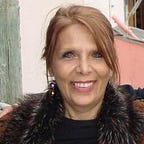Teach the Circular Theory
Integrated Thought Institute (Intelligent Design Center): Virtual and Real
Destruct and Reconstruct
Nature is designed to self-destruct, because ‘destruct’ and ‘construct’ share a ubiquitous circle. So, after deconstruction, reconstruction. And, always, vice-versa. This applies to all systems and disciplines. Why everyone needs to know about the Circular Theory.
50–50 is the ‘constant’ and the ‘norm.’ So, the Circular Theory is timely, applicable to ‘everyone’ and ‘everything,’ and very easy to teach.
Conservation of the Circle is the Theory of Everything physicists ‘search’ for. Even though everybody already knows it already. Forcing all of us to question the ‘reality’ called ‘time…’
Click through circular theory articles to see this.
Ubiquitous 50–50
Humans operate using the binary choice (again, a ubiquitous, underlying circle). So, we can always go with the program, teach the program, prepare to destruct. And-or, eventually, get ready to reconstruct.
This is especially obvious, and relevant, today. We live in a digitally ‘chaotic’ (hyper-redundant) reality, forcing a deeper understanding of the number ‘two’ (a perpetual ‘zero’ and-or ‘one’) on all of us.
So, you can help others by learning the Circular Theory. And, then, teaching the Circular Theory.
Zeroing in on The Number ‘Two’ (Digital Mathematics)
Meaning, there is a circular relationship between you, and, the number ‘two.’ Without which you could not function.
This is the basis for data. Data science. Information theory. Information technology. Artificial intelligence. Virtual reality. Deep learning. Machine learning. Intelligent Autonomy. Superposition. The qubit.
Biology, physics, chemistry. Psychology, philosophy, history. Economics, finance, art, music, and design. All of the disciplines we use to study Nature (and the construction, and deconstruction, of ‘reality’).
Universal System Architecture (Controlling and Explaining Everything)
So, this produces the ‘Universal System Architecture’ supporting Nature (technology and biology).
And, also, then, the most realistic thought paradigm, and ‘philosophy,’ for the ‘digital’ age.
Conservation of the circle is the core dynamic in nature.
